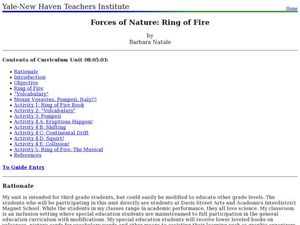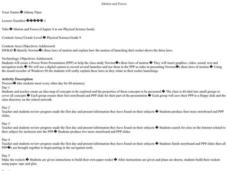Teach Engineering
Fairly Fundamental Facts About Forces and Structures
Don't twist and turn looking for a resource. The first installment of a six-part series teaches young engineers about the five fundamental forces of compression, tension, shear, bending, and torsion. These forces help explain different...
EduGAINs
Form and Function
Will that structure survive the force? The differentiated lesson allows pairs to choose the structure they would like to construct and the building materials they wish to use. Individuals record their findings in...
Institute of Electrical and Electronics Engineers
Fun with Speedboats!
After reading about marine engineers and naval architects, it's all hands on deck to design and test a speed boat. This lesson is designed for the Next Generation Science Standards in engineering and can be a centerpiece for a STEM...
Curated OER
Forces of Nature: Ring of Fire
Third graders will research the Ring of Fire and be able to share their findings with their partner. They will also demonstrate volcanic eruptions using a baking soda and vinegar volcano model. Then they will discover how continental...
NOAA
Tides
Low tides, high tides, spring tides, neap tides, diurnal tides, semidiurnal tides, mixed tides ... just how many types of tides are there? The 10th installment of a 23-part NOAA Enrichment in Marine sciences and Oceanography (NEMO)...
Curated OER
Forces and Newton's Laws Unit
Students participate in lessons on Forces and Newton's Laws by selecting activities and assignments to complete in a Layer Unit. Students select assignments and activities in the C Level, B Level, and A Level.
Curated OER
The Net Force and Rube Goldberg
Students investigate net force by building Rube Goldberg contraptions. They build a contraption that has at least 6 steps or moves.
Curated OER
The Legendary Raptors
How are raptors and airplanes alike? Combine science and language arts in this fun and interactive project. Young scientists research the animal in order to design their own aircraft, and compete in a contest for farthest, fastest, and...
LABScI
Harmonic Motion: Pendulum Lab
Several times throughout history, groups of soldiers marching in rhythm across a suspension bridge have caused it to collapse. Scholars experiment with pendulums, resonance, and force to determine why this would happen. First, pupils...
Chicago Botanic Garden
Historical Climate Cycles
What better way to make predictions about future weather and climate patterns than with actual climate data from the past? Young climatologists analyze data from 400,000 to 10,000 years ago to determine if climate has changed over...
Curated OER
Velocity of Traffic on Highway 26
Physics fanatics time five cars as they pass on the highway. They use the times and a 20-yard distance to calculate velocity. They also graph distance vs. time. A page of student pre-lab questions is provided in addition to the activity...
Curated OER
Motion and Forces
Ninth graders create PowerPoint presentations to present Newton's three laws of motion, and make and launch rockets.
Curated OER
Creeping Sheets of Ice
Students conduct scientific investigation in which they observe glacial
effects on landscape, develop and explain their own theories of how glaciers change land, and demonstrate understanding and explain basic motion and force principles.
Tech Museum of Innovation
Energy at Play
Get the ball rolling and challenge your class to figure out how to make a ball move. The instruction segment is between two STEM activities devoted to doing just that. The first is simple and involves making a ball move from some...
Curated OER
Exploring Magnets and Magnetism
Here is a very good lesson on magnets, magnetism, and magnitic fields that is chock full of great activities for you to implement with your young scientists. Learners discover the properties of magnets, look at the forces of attraction...
Chicago Botanic Garden
Historical Climate Cycles
Scientists use ice core samples to obtain temperatures of the earth from 400,000 years ago! The third of five lessons instructs pupils to interpret historical climate data to see changes over time. In part I, participants interpret...
Curated OER
Forces and Acceleration Unit
Young scholars investigate that an unbalanced force, acting on an object, changes it speed or path of motion or both, and know that if the force always acts toward the same center as the object moves, the objects path may curve into an...
Curated OER
By Bernoulli, Where's Gravity?
Students observe a 1/4 inch by 2 inch piece of paper that is held vertically downward under the bottom lip, noting that the paper is pulled down by gravity. They predict what happens to the paper if air is blown out. After air is blown,...
Curated OER
Speedy Trials
Fifth graders investigate how forces affect the motion of an object. In this physics lesson, 5th graders calculate an object's speed using a mathematical formula. They discuss how force and mass affects the speed.
Curated OER
Sitting on Nails-Boyle's Law
Students experience pressure as a force per unit area in this experiment with a board of nails. In this physics lesson, students discover Boyle's law as they perform experiments with pressure.
Curated OER
Friction in Our Lives
Students explore force and friction. In this force and friction lesson, students discover everyday examples of how friction helps and hinders things we do. Students create a ramp to test the speed of their car. Students use...
Curated OER
The Moon Orbits the Sun?!?!
Students calculate the strength of gravitational force exerted on the moon by the sun and earth. In this orbital lesson students view a demonstration to see the gravitational forces between bodies.
Curated OER
Classify Forces
Third graders compare and contrast the forces of pushing and pulling. As a class, they take a field trip around the school and write down any action they see and any object that is motionless. In groups, they use magazines to cut out...
Curated OER
Science: Einstein's Big Idea
Students explore the various aspects of Einstein's energy equation and discover how energy is transferred from one form to another. In teams, they rotate through seven stations to experience such aspects of energy change through...























